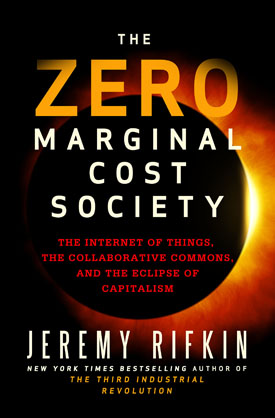Jeremy Rifkin has done it again. The author of one of the most insightful and influential books of the late 20th century, The End of Work (1995), Rifkin understands the deep structure of our rapidly changing economic system. In his new book, The Zero Marginal Cost Society, Rifkin illustrates how massively computer-based activity will come to displace paid employment as a fundamental driver of our increasingly social economy.
Developing the concept of the Commons (more along the lines of Roger A. Lohmann than Elinor Ostrom), Rifkin once again shows his ability to comprehend the rapidly changing social economics of our times. In an earlier book, The Age of Access (2000), Rifkin noted the ability of the owners of electronic products to secure an economic return from their creations. But in the ZMC Society (Rifkin must hope that we will learn some such acronym to replace the rather ungainly title of his book), electronic control is seen as at least challenging such monopolies of control.
Social networks increasingly assert their creative and regulatory powers in times of ZMC. Creators of all sorts of products, from songs to books to blogs to diagnostic advice, place their products in front of anyone able to google their topics. Rifkin details the manifold instances by which such contemporary processes work. Sure there are expenses of entry: a computer, an operating system, access to wifi, and a few subscriptions to trusted sources of information. Beyond that, it's happy surfing, and the purchase of those services that remain beyond our immediate grasp until we learn to "prosume" them -- even including such necessities as electricity and food.
The trick for the consumer in the ZMC society involves holding down, if not altogether escaping, the fixed costs of access. The rational "ZiMCer," to coin my term, first realizes that his most limited resource is time. My first choice was easy: Cut the cable and do entirely without conventional television. I've been off for 3 ½ years and now don't even turn on the TV when I stay in a hotel. When something notable appears on TV, like the non-stop coverage of a missing plane or an occasional mention of intelligent policy in a presidential debate, I often get my first notice of such events from a daily posting of the Borowitz Report.
What might have been gained from TV, it turns out, is available in far greater quality and quantity on the web, particularly on YouTube. I use my broadband allotment to watch BBC series like Hotel Babylon when I feel like mindless viewing, and the world of great opera performances when I want to partake in that direction. News I find I can get from my subscription to the New York Times and an occasional dip into the hometown press when I am on the road. For analysis, the New Yorker and Atlantic give me more than I can digest. As emeritus, I retain access to the powerful Rutgers web network, so paid subscriptions are rarely needed.
When my broadband allotment approaches its limits, I can always try to find a seat in the cathedral of the ZMC age, the coffee shop with free wifi. Here my ZMC is reduced to a couple of dollars, and, frankly, I'd have bought the coffee without the access. But certainly, thanks are due my favorite ZMC providers: Java Haute of Indiana, Hobbs of Swarthmore, Angelika of Budapest.
Books are a bit more of a problem, but, really, who reads (or at least buys) books anymore. The author of The Zero Marginal Cost Society surely hopes the readers of this blog will buy a copy of his new book, but he also knows that most of us will be content with reading excerpts from its pages that both he and the web will provide us cost-free. Knowing Jeremy, he will be quite happy to receive the comments we are making on this site, and reviews in the world's leading papers, as well as serious mentions on those TV shows I will not be watching. Alan Ginsberg got it right: In the ZMC society, the reader tries to steal the book, and most of us authors are willing to play along, offering our deathless prose cost-free onto the web, forgetting entirely about the once-sought but increasingly elusive matter of royalties.
If we really do need to read an actual book, or its electronic simulation, it can of course be purchased or rented online, or borrowed from a library. Costs fall rapidly in this industry, and a great deal may be found on line for free once copyrights expire. Living in Budapest as I do half the year, I find plenty to read on a monthly books budget that rarely exceeds $50.
There, I finally mentioned money. And that raises one concern about ZMC -- just how is it that most of us will be able to secure an income when so many things we pride ourselves in offering to the market carry little, if any, financial return? As the One Percent completes its task of owning nearly everything of value, it's nice to think that we might be able to search its web at little cost, but where will we find something to eat, or secure a roof over our heads?
In The End of Work, Rifkin presented several answers to this question: 1) increase taxes on the super-rich; 2) shorten the work week; and 3) fund the third (nonprofit, philanthropic) sector -- what he now calls the Collaborative Commons. He advances this analysis in this work, as my colleague Roger A. Lohmann argues in his comment. But for now, on top of needing to solve problems of redistributing income, wealth, and work -- society is faced with the massive challenges presented by each of us becoming "prosumers." As a lifelong scholar and activist in society's third sector, I look forward to joining the dialogue on how voluntary and nonprofit action can replace our creaking capitalist economy.